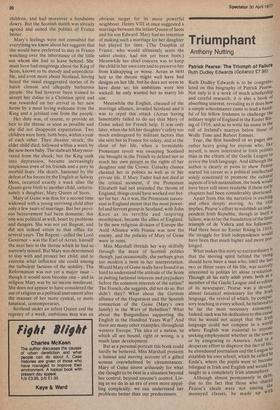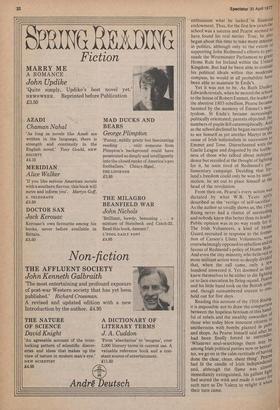Triumphant
Anthony Nutting
Patrick Pearse: The Triumph of Failure Ruth Dudley Edwards (Gollancz £7.95) Ruth Dudley Edwards is to be congratulated on this biography of Patrick PearSe• Not only is it a work of much scholarshiP and careful research; it is also a book of absorbing interest, revealing as it does how a simple schoolmaster came to lead a handful of his fellow Irishmen to challenge the military might of England in the Easter Rising of 1916, and so to write his name in the roll of Ireland's martyrs below those of Wolfe Tone and Robert Emmet.
True, the first hundred or so pages are rather heavy going for anyone who, like myself, is more interested in Irish politics than in the efforts of the Gaelic League to revive the Irish language. And although the author is clearly at pains to show Pearse started his career as a political intellectual solely concerned to promote the cultural aspects of Irish nationalism, the book would have been still more readable if these earlY chapters had been considerably shortened. Apart from this the narrative is exciting and often deeply moving. As the title implies, Pearse's effort to establish an independent Irish Republic, though in itself a failure, was to lay the foundation of the later triumph of de Valera and his followers, Had there been no Easter Rising in 1916, the struggle for Irish independence would have been that much higher and more Prolonged. What makes this story so extraordinary iS that the moving spirit behind the rising should have been a man who, until the last two or three years of his life, was scarcelY interested in politics let alone revolution, Through all his early adult years, both as a member of the Gaelic League and as editor of its newspaper, Pearse was a devout, almost fanatical missionary for the Irish language, the revival of which, by comPul" sory teaching in every school, he believed to be far the most necessary autonomy. Indeed, such was his dedication to this cause that he would not accept that the Irish language could not compete in a world where English was essential to anyone seeking employment whether in the towns or by emigrating to America. And in a desperate effort to disprove this fact of life, he abandoned journalism and the League to dstablish his own school, which he called St Enda's, where the pupils were to becoMe bilingual in Irish and English and would he taught in a completely Irish atmosphere.
Although almost permanently in debt,' due to the fact that those who sharr Pearse's ideals were not among th! moneyed classes, he made up wit"
enthusiasm what he lacked in financial endowment. Thus, for the first few years the school was a success and Pearse seemed to have found his real metier. True, he also began about this time to take more interest in politics, although only to the extent of supporting John Redmond's efforts to per" suade the Westminster Parliament to grant Home Rule for Ireland within the United Kingdom. But had he been able to contain his political ideals within this moderate compass, he would in all probability have been able to maintain St Enda's.
Yet it was not to be. As Ruth Dudley Edwards reveals, when he moved the school to the house of Robert Emmet, the leader of the abortive 1803 rebellion, Pearse became haunted by the memory of Emmet's mar" tyrdom. St Enda' s became increasinglY politically orientated; parents objected; the numbers of pupils fell catastrophically. MU as the school declined he began increasinglY to see himself as yet another Martyr in the cause of Irish nationalism in succession fe Emmet and Tone. Disenchanted with the Gaelic League and disgusted by the feebleness of those who talked about indepen-. dence but recoiled at the thought of fighting for it, he soon tired of Redmond's Parliamentary campaign. Deciding that Ireland's freedom could only be won by insurrection, he set out to place himself at the head of the revolution.
From then on, Pearse's every action V4° dictated by what W.B. Yeats aptlY described as the 'vertigo of self-sacrifice • As the author so vividly shows us, the 1916 Rising never had a chance of succeeding and nobody knew this better than its leadc.1% Public opinion was in no way ready for if. The Irish Volunteers, a kind of Home Guard recruited in response to the formation of Carson's Ulster Volunteers, vier.e overwhelmingly opposed to rebellion and ill favour of Redmond's policy of Home Rale. And even the tiny minority who believed more militant action were so deeply divide° that, when the call came, only a few hundred answered it. Yet doomed as the knew themselves to be either to die fightl or to face execution by firing-squad, Pears and his little band took on the British arrnY and, though outnumbered sixteen to orie' held out for five days. Reading this account of the 1916 Rising' it is impossible not to draw the comparison. between the hopeless heroism of this hand, ful of rebels and the stealthy cowardice 0,11 those who today blow innocent citizens L smithereens with bombs planted in Pa' and shops. As Pearse himself said after._115 had been finally forced to surrenaei; 'Whatever soul-searchings there may f, among Irish political parties now or herea ter, we go on in the calm certitude of hal done the clear, clean, sheer thing'. Pears,e had lit the candle of Irish independenit and, although the flame was alin.°,"t immediately extinguished, his gallant firr had seared the wick and made it easier 'or such men as De Valera to relight it Wile their turn came.



































 Previous page
Previous page